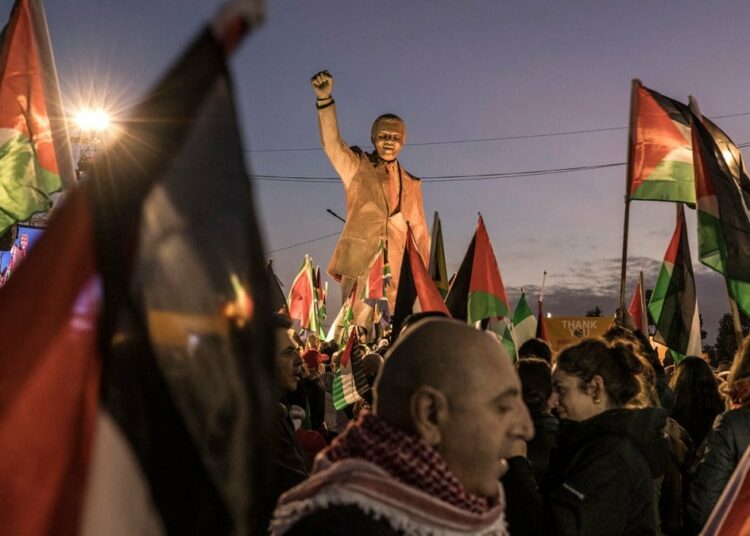Whatever is currently happening to humanity, it is happening to all of us. No matter how hidden the cruelty, no matter how far off the screams of pain and terror, we live in one world.” – Alice Walker
The world is currently facing a multitude of crises particularly the increased fragility and dysfunction in the international system and lately the geopolitical instability and conflict between Israel and Palestine.
The impact of the works of Hans Morgenthau’s “Politics Among Nations: The Struggle for Power and Peace” (Morgenthau 1956) and Hedley Bull’s “The Anarchical Society: A Study of Order in World Politics” (Bull 2012) on the early stage of international morality brings to question the state-centric and anarchical nature of international politics and the growing moral concerns about the role of the United Nations in international peace and security and the broader issues of the United States of America’s double standard in the crisis between Israel and Palestine and their preparedness in instigating proxy wars in the Middle East.
The Palestinian-Israeli question is a moving, deadly monster poised to threaten the peaceful coexistence of the world. As long as America and other superpowers continue to deny the existence of native Palestinian in Gaza, the violence will fester and the current ineffective security arrangements will elude the world.
The superpowers and their allies’ parochial interest and narrow agenda will continue to jeopardise global peace and security, while they lie to the rest of the world about their democratic credentials of promoting peaceful coexistence and the common good. Furthermore, America’s rogue interventions and hypocrisy, if not checked by other powers like South Africa through legal means, will eventually sink both belligerent parties. Nations must tap into the readily available button of ‘no victor, no vanquished’ philosophy and rapprochement in dealing with violent vengeance on the people of Palestine.
International power brokers must rethink their resolve to protect the interest of the international community. Mere Political brinkmanship is no longer currency in the pursuit of international diplomacy and struggle for power. World leaders irrespective of their political persuasions should rethink the strategy for global peace and security. Israel must review her tragic sense of entitlement, which hinders the two-state solution. On the other hand, Hamas/Palestine must checkmate their aggressive tendencies in pursuit of their political interest in Gaza.
Interestingly, the South African government under the leadership of Cyril Ramaphosa has shown good leadership in international relations. It is no longer news that the South African government instituted a genocide case at the International Court of Justice (ICJ) against the Israeli Government. They reasoned that the Israeli government’s continued attacks on Gaza amount to genocide. The full determination of the case remains to be seen in the nearest future.
Pointedly, the 1948 United Nations Convention for the Prevention and Punishment of the Crime of Genocide and article 6 of the 1998 Rome statute of the International Criminal Court defines genocide as an act committed with intent to destroy, either in part or in whole, a national, ethnical, racial or religious group, including: killing members of the group, causing serious bodily or mental harm to members of the group, deliberately inflicting conditions of life calculated to bring about a group’s physical destruction, in whole or in part, imposing measures to prevent births and forcibly transferring children.
Sadly, over the years, the UN and its legal institutions is not respectful of international law, international humanitarian law and international human rights law. Therefore, the principle of selective morality and double-standard has been a major challenge in the international system while Israel’s national survival is a moral principle to pursue. Nevertheless, ethical and moral judgment of the political leaders on both sides of the divide must understand the political consequences of their actions within the framework of international humanitarian law and International criminal law respectively.
Going forward, the challenge of the ICJ ruling would be on how to enforce it and the respectability of court judgements. A case in point is that of Nicaragua vs the United States in 1986 where the USA would not respect the decision of the court. With the benefit of hindsight, Israel and its most powerful supporters would dispute and ultimately ignore the final decisions of the court. That will be in the realm of grave infractions against human rights and due process in international relations.
Particularly worrying is the human pain suffered by children, women and the elderly in Gaza and other threats that prowl on the horizon, such as the possibility of further escalation of terrorism, profound humanitarian breaches and health emergencies due to lack of access to civilian population in need and the humanitarian dilemma therein.
The horrifying scenes smack irresponsibility on the part of the West often mouthing human rights and democracy. Besides the humanitarian concerns, the United Nations and other western powers inability to broker a definite cease-fire and pronouncing a two-state solution over the years remain problematic in international conflict resolution mechanisms.
– Orovwuje, a human rights advocate, writes from Lagos
Furthermore, the lack of political will to resolve this age-long war put a scare on the United Nations, and the USA in particular. The Israel-Palestine war will continue to divide the world and fuel global terrorism if not checked. Therefore, world leaders should adopt a restraints-based policy regime that would reverse the slide toward the current crisis and long-drawn-out conflict.
All efforts must be rooted in international human rights, international humanitarian law and above all, international criminal law. Political commitment and efforts on both sides to build a cooperative muscle to put behind the historical past with a view to having peaceful trajectory to a two-state solution would be a sweet-smelling savour in reshaping peace and security.
While there are skeptics on both sides, it is the responsibility of both leaders to demonstrate to their people that peaceful and inclusive coexistence is possible within the framework of international law and they must come to terms that the west is exploiting them to sustain their war industry. The United Nations and the global north must depoliticise diplomacy and sustain strategic channels of communication and make them regular features of crisis management framework in Gaza and elsewhere in the world.
The commitment necessary for conflict resolution by the United Nations Security Council with no clear-cut resolution mechanisms for ceasefire and the political will to bring forth the two-state solution is provokingly worrisome.
One of the challenges of our time is the question of selective international morality and double-standard by the established institutions of western liberal democracies. The culture of cruelty and savage capitalism is gradually pulling the world apart particularly the acts of violence against minorities across the globe.
All things considered, a clear people-to-people channels of communication should be explored to address the misinformation, disinformation and misunderstanding of the conflict between Palestine and Israeli. Small to medium powers should support the cause of South Africa. The world has seen enough of selective morality and double standards. Therefore, the world needs to build a community of inclusive coexistence through the promotion of global peace recovery and solidarity.
Orovwuje, a human rights advocate, writes from Lagos





